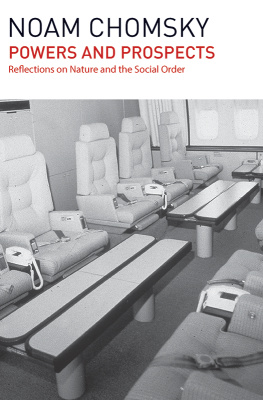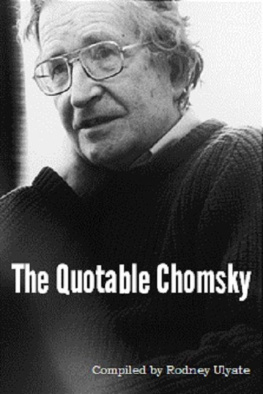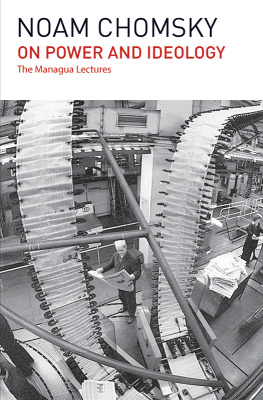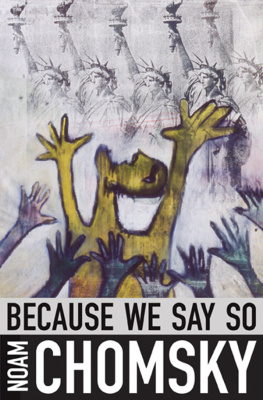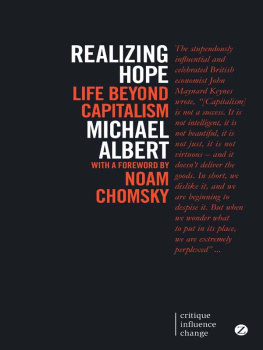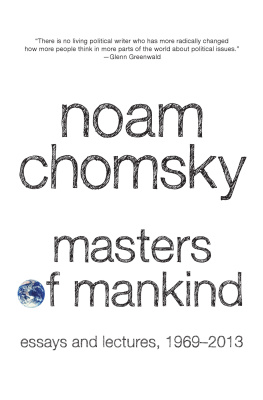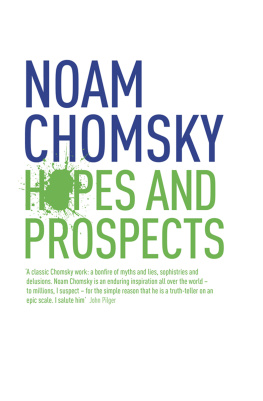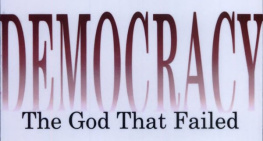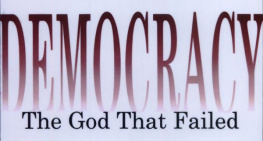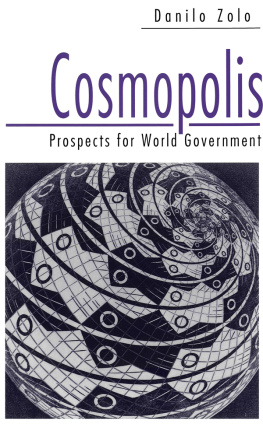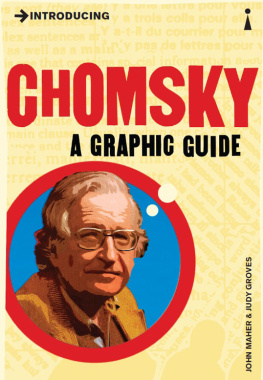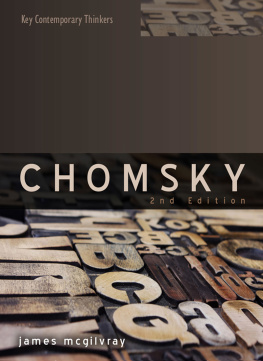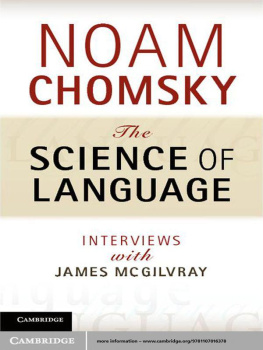Contents
Language and Thought: Some Reflections on Venerable Themes
The study of language and mind goes back to classical antiquityto Classical Greece and India in the pre-Christian era. It has often been assumed over these millennia that the two inquiries have some intimate relation. Language has sometimes been described as a mirror of mind, so that the study of language should then give unique insight into human thought. That convergence, which has been repeated over the centuries, took place again about 40 years ago, at the origins of what is sometimes called the Cognitive Revolution. I will use the term intending you to hear quotes around the phrase cognitive revolution, expressing some scepticism; it wasnt all that much of a revolution in my opinion.
In any event, however one assesses it, an important change of perspective took place: from the study of behaviour and its products (texts, and so on) to the internal processes that underlie what people are doing, and their origin in the human biological endowment. The approach to the study of language that I want to consider here has developed in that context, and was a significant factor in its emergence and subsequent progress.
The First Cognitive Revolution
Much the same convergence had taken place in the seventeenth century, in what we might call the first cognitive revolution, perhaps the only real one. This was part of the general scientific revolution of the periodthe Galilean revolution, as it is sometimes called. There are interesting features in common between the contemporary cognitive revolution and its predecessor. The resemblance was not appreciated at the outset (and still is hardly well known) because the history had been largely forgotten. Such scholarly work as existed was misleading or worse, and even basic texts were not available, or considered of any interest. The topic merits attention, in my opinion, not just for antiquarian reasons. My own view is that we have much to learn from the earlier history, and that there has even been some regression in the modern period. I will come back to that.
One element of similarity is the stimulus to the scientific imagination provided by complex machines. Today that means computers. In the seventeenth and eighteenth centuries it meant the automata that were being constructed by skilled artisans, a marvel to everyone. Both then and now the apparent achievements of these artefacts raises a rather obvious question: Are humans simply more complex machines? That is a topic of lively debate today, and the same was true in the earlier period. It was at the core of Cartesian philosophybut it is worth remembering that the distinction between science and philosophy did not exist at the time: a large part of philosophy was what we call science. Cartesian science arose in part from puzzlement over the differenceif any between humans and machines. The questions went well beyond curiosity about human nature and the physical world, reaching to the immortality of the soul, the unchallengeable truths of established religion, and so onnot trivial matters.
In the background was the mechanical philosophy, the idea that the world is a complex machine, which could in principle be constructed by a master craftsman. The basic principle was drawn from simple common sense: to interact, two objects must be in direct contact. To carry through the program of mechanisation of the world view, it was necessary to rid science of neoscholastic sympathies and antipathies and substantial forms, and other mystical baggage, and to show that contact mechanics suffices. This endeavour was considerably advanced by Descartes physics and physiology, which he regarded as the heart of his achievement. In a letter to Mersenne, his confidant and most influential supporter in the respectable intellectual world of the day, Descartes wrote that his Meditations , today commonly considered his fundamental contribution, was a work of propaganda, designed to lead readers step-by-step to accept his physics without realising it, so that by the end, being entirely convinced, they would renounce the dominant Aristotelian picture of the world and accept the mechanical world view. Within this context, the question of limits of automata could not fail to be a prominent one.
The Cartesians argued that the mechanical world view extended to all of the inorganic and organic world apart from humans, even to a substantial part of human physiology and psychology. But humans nevertheless transcend the boundaries of any possible machine, hence are fundamentally different from animals, who are indeed mere automata, differing from clocks only in complexity. But however intricate a mechanical device might be, the Cartesians argued, crucial aspects of what humans think and do would lie beyond its scope, in particular, voluntary action. Set the machine in a certain state in a particular external situation, and it will be compelled to act in a certain way (random elements aside). But under comparable circumstances, a human is only incited and inclined to do so. People may tend to do what they are incited and inclined to do; their behaviour may be predictable, and a practical account of motivation may be possible. But theories of behaviour will always miss the crucial point: the person could have chosen to act otherwise.
In this analysis, the properties of language played a central role. For Descartes and his followers, notably Graud de Cordemoy, the ability to use language in the normal way is a criterion for possession of mindfor being beyond the limits of any possible mechanism. Experimental procedures were devised that could be used to determine whether some object that looks like us is actually a complicated machine, or really has a mind like ours. The tests typically had to do with what I have called elsewhere the creative aspect of language use, a normal feature of everyday usage: the fact that it is typically innovative, guided but not determined by internal state and external conditions, appropriate to circumstances but uncaused, eliciting thoughts that the hearer might have expressed the same way. If an object passes all the tests we can devise to determine whether it manifests these properties, it would only be reasonable to attribute to it a mind like ours, the Cartesians argued.
Notice that this is normal science. The available evidence suggests that some aspects of the world, notably the normal use of language, do not fall within the mechanical philosophyhence cannot be duplicated by a machine. We therefore postulate some further principle, a kind of creative principle, that lies beyond mechanism. The logic was not unlike Newtons, to which Ill return. In the framework of the substance metaphysics of the day, the natural move was to postulate a second substance, mind, a thinking substance alongside of body. Next comes the problem of unification: how do we relate these two components of the world? This was a major problem of the period.
These intellectual moves were not only normal science, but also pretty reasonable. The arguments that were given are not without force. We would frame the issues and possible answers differently today, but the fundamental questions remain unanswered, and puzzling.
Fascination with the (possible) limits of automata is one respect in which the first cognitive revolution has been in part relived in recent years, though the usual preoccupation today is the nature of consciousness, not the properties of normal human action that concerned the Cartesians; crucially, the apparent fact that it is coherent and appropriate, but uncaused. Another similarity has to do with what are nowadays called computational theories of mind. In a different form, these were also a salient feature of the first cognitive revolution. Perhaps Descartes most lasting scientific contribution lies right here: his outline of a theory of perception with a computational flair (though our notions of computation were unavailable), along with proposals about its realisation in bodily mechanisms.
Next page
